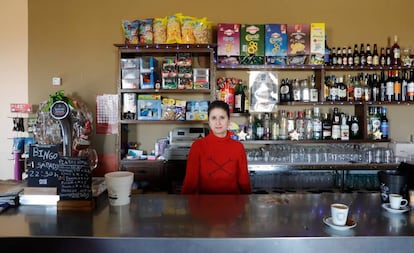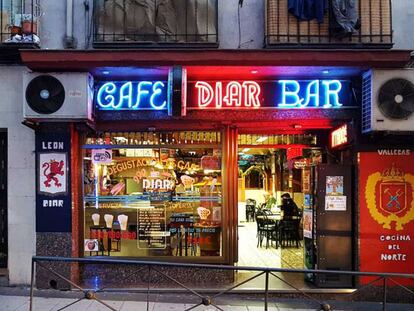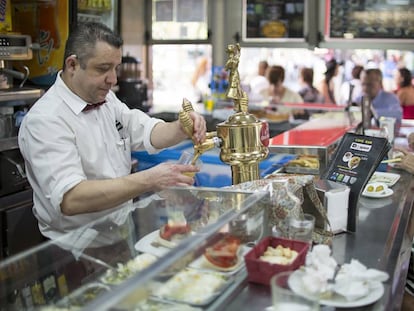Raising the bar: Why Spanish villages are fighting to keep their locals open
In places like Villalbarba, where there are only 132 people, residents say there would be no social life if they could not come together for a coffee or a game of bingo


There were several months in which the only bar in Villalbarba was the one in its name. In this village of 132 people in Spain¡¯s northern Valladolid province in Castile and Le¨®n, there was nowhere to play a heated game of dominoes, have a coffee or drink a beer. Locals either stayed at home or went for a walk in the endless greenery that surrounds the village ¨C two options that did little to stimulate social relations. As one man put it: ¡°If there is no decent bar in a village, nobody sees anybody.¡±
A village without a bar is a dead village Carlos Mart¨ªnez, town mayor of?Villalbarba
Then Yasm¨ªn Colino turned up. The 31-year-old from Zamora was chosen by the town council to run the local bar and a small grocery store. In return, she does not have to pay rent for her home or the two premises.
The promise of a rent-free home and business premises attracted 600 applicants from as far afield as Barcelona and the Canary Islands. No one from Villalbarba applied. Nicol¨¢s Petite, 59, the local bailiff, says this shows the depth of the economic crisis in Spain ¨C the applicants were not worried about making money, just surviving.
In the Castile and Le¨®n region, there are 2,000 fewer bars now than there were in 2010. According to a report by the Spanish Hospitality Federation, the number of bars in all the provinces of the region fell in 2018.
According to the village¡¯s mayor Carlos Mart¨ªnez, from the conservative Popular Party (PP), ¡°a village without a bar is a dead village. A bar offers a public service.¡± The 34-year-old, who works in digital marketing in Valladolid, applauds the work Yasm¨ªn has done and says that social networks were key to getting her there. When the offer was posted on Facebook in January, the town council was inundated with replies.
Every morning, Yasm¨ªn opens her small shop before opening the bar a few hours later. She gets just five customers on this sunny Friday morning, despite it being Constitution Day and a national holiday. The streets, which are clean and lined with refurbished properties, are also empty.
Yasm¨ªn¡¯s friendly tone changes when she speaks about how people complain about not having a bar, but are not willing to spend enough to keep it up and running. She plans to stay put for a while to make back her investment, but if the customers don¡¯t start coming in, she will have to make some difficult decisions. The bottles that line the shelves don¡¯t come cheap. Nor does the heating that warms the large space, which is filled with wooden tables and chairs. A Christmas tree stands in one corner, alongside a Christmas hamper, complete with a leg of ham, waiting for someone to buy raffle tickets.
The cups of coffee and chupitos (shots) that the mostly elderly locals tend to order don¡¯t do much to fill the cash register. The locals explain that they usually drop by the bar in the afternoons after lunch, but they don¡¯t spend much. Naturally, when younger customers come in and ask for drinks and food, Yasm¨ªn¡¯s face lights up ¨C a combo-meal costs €3.50 and the complete lunch menu goes for €6.
Villalbara resident Alfonso Ruiz agrees that ¡°a village without a bar is a terrible thing.¡± At the age of 80, he likes to kill time drinking a good whisky in the afternoons. His partner, the vivacious Mar¨ªa Garc¨ªa, adds that activities such as memory games or exercise routines that take place in the back room of the bar are meant to bring Yasm¨ªn more customers, without them having to spend too much. If Yasm¨ªn takes off, it will be an end to bingo on Saturday nights, or the smell of coffee, and the building, which was once a primary school, will become silent again.
A village without a bar is a terrible thing Villalbara resident Alfonso Ruiz
¡°I am not an entrepreneur, just an old man,¡± says Dionisio Ca?era, 75, the mayor of Herguijuela del Campo, a village of just 83 individuals in the province of Salamanca. When it lost its bar, the people living there scarcely interacted. Then the mayor had the bright idea of setting up a self-service bar, trusting the locals to pay for their food and drinks. He took charge of buying the provisions and left them on the premises; 50 cents for a coffee, €1 for a beer.
Every month, it makes around €40 in profit, but that is not the point. It¡¯s about reviving the village¡¯s sense of community. ¡°If it wasn¡¯t for the bar, we wouldn¡¯t see one another,¡± he says.
His trust has paid off. Not only has the initiative lasted four years, the bar also doubles as a social center and can be booked for birthdays or parties.
Ca?era¡¯s goal is to attract more visitors to the village. To achieve this, he has bought six goats, which graze on some nearby land, and act as a tourist attraction. While parents stop by the bar for a drink, the children play with the animals.
20,000 bars have closed since 2010
Keeping bars open in villages in the Valencia region is no mean feat. Thirty years back in La Portera, a village of around 100 people, there was a pharmacy, two stores and two bars. Now only one bar remains, surviving on subsidies from the local council. It acts as a social center and the council pays for the heating and electricity.? A couple is currently running the place, serving sandwiches and drinks at a reasonable price. In the last few years, it has been managed by a number of different families from Spain, Poland and Latin America.
The demographic changes in Spain have had a significant impact on business models in the service sector. In Castile and Le¨®n, the tourist accommodation on offer has increased by almost 500 units between 2010 and 2018 ¨C 200 of which are from rural hotels, bringing the total to 2,600 according to the Spanish Hospitality Federation. Meanwhile, in a country famed for its tapas culture, bars have gone into decline, with 20,000 closing since 2010.
English version by Heather Galloway.
Tu suscripci¨®n se est¨¢ usando en otro dispositivo
?Quieres a?adir otro usuario a tu suscripci¨®n?
Si contin¨²as leyendo en este dispositivo, no se podr¨¢ leer en el otro.
FlechaTu suscripci¨®n se est¨¢ usando en otro dispositivo y solo puedes acceder a EL PA?S desde un dispositivo a la vez.
Si quieres compartir tu cuenta, cambia tu suscripci¨®n a la modalidad Premium, as¨ª podr¨¢s a?adir otro usuario. Cada uno acceder¨¢ con su propia cuenta de email, lo que os permitir¨¢ personalizar vuestra experiencia en EL PA?S.
En el caso de no saber qui¨¦n est¨¢ usando tu cuenta, te recomendamos cambiar tu contrase?a aqu¨ª.
Si decides continuar compartiendo tu cuenta, este mensaje se mostrar¨¢ en tu dispositivo y en el de la otra persona que est¨¢ usando tu cuenta de forma indefinida, afectando a tu experiencia de lectura. Puedes consultar aqu¨ª los t¨¦rminos y condiciones de la suscripci¨®n digital.










































